February 2026

The global precision oncology market is expected to reach an estimated USD 341.51 billion by 2035, growing from USD 132.87 billion in 2025 at a steady CAGR of 9.9% (2026 - 2035). This growth is driven by the rising prevalence of cancer and the increasing demand for personalized medicine.
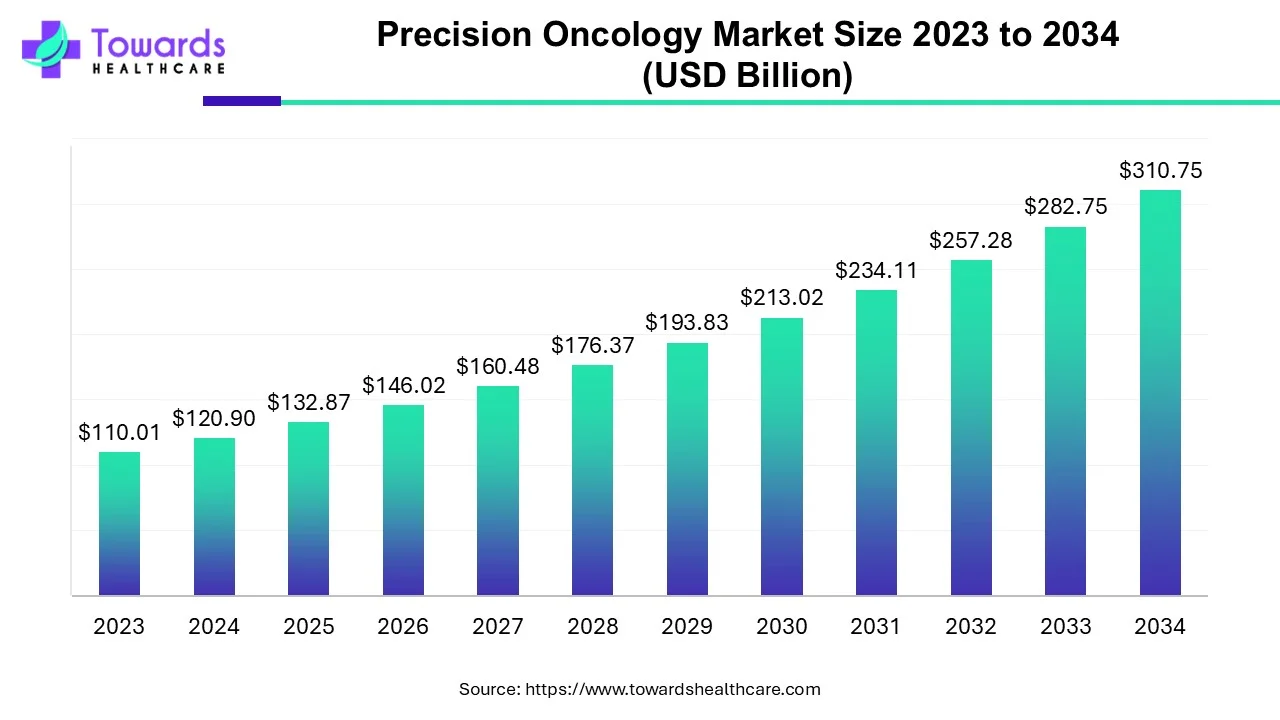
| Key Elements | Scope |
| Market Size in 2026 | USD 146.02 Billion |
| Projected Market Size in 2035 | USD 341.51 Billion |
| CAGR (2026 - 2035) | 9.9% |
| Leading Region | North America |
| Market Segmentation | By Product, By Cancer Type, By End-Use, By Region |
| Top Key Players | AbbVie, ACT Oncology, AstraZeneca, Bristol Myers Squibb, Gilead Sciences, Illumina, Inc., Insilico Medicine, Johnson & Johnson, Maze Therapeutics, Inc., Myriad Genetics, Novartis, Pfizer, Qiagen N.V., Roche Diagnostics |
The precision oncology market refers to the application of advanced technologies and personalized medicine approaches to diagnose, treat, and manage cancer. It involves the use of genomic analysis, molecular diagnostics, targeted therapies, and data analytics to understand the unique genetic characteristics of a patient's tumor and develop individualized treatment plans. Precision oncology aims to improve treatment outcomes, minimize side effects, and enhance patient quality of life. The precision oncology market is expanding rapidly, driven by advancements in genomic sequencing technologies that enable the identification of genetic alterations and biomarkers for personalized treatment selection.
Additionally, the increasing prevalence of cancer globally is driving the demand for more precise and personalized treatment options. The rising incidence of cancer, coupled with the growing understanding of the complex molecular and genetic mechanisms underlying the disease, has created a strong market for precision oncology solutions.
Precision medicine aims to provide the right cancer treatment to the right patient at the right dose and time. That same year, the first draft of the human genome was completed, followed by the sequencing of cancer genomes. The rapid discovery of driver mutations and effective tyrosine kinase inhibitors in cancers like non-small cell lung cancer and melanoma led to the development of quick and affordable PCR-based assays to detect these mutations. This sparked a surge of interest in molecular profiling.
At the heart of precision oncology is the understanding that somatic mutations drive cancer development. Driver mutations in oncogenes lead to uncontrolled cancer growth, while mutations in tumor suppressor genes, which normally help control tumor formation, can also drive cancer when they are lost or inactivated. To identify all possible genetic alterations, a multi-omic approach using various technologies is recommended. However, the abundance of technologies and commercial tests, along with sometimes conflicting results, can overwhelm clinicians. Even in top academic centers, oncologists often feel uncertain about how to apply genomic findings effectively.
For a genomic test to be useful, it should accurately predict how a patient will respond to targeted treatments. An early example of this was testing for HER2 positivity in solid tumors, where positive results predicted a good response to trastuzumab-based therapies. As we move toward testing multiple genes and other biological markers, the same principle applies: the genetic alteration should predict the response to a specific treatment.
The success of precision medicine in practice has been mixed. Some studies have not shown improved outcomes from matched therapies due to design issues, while large retrospective studies have found that 80%–90% of patients have potentially actionable genomic alterations. However, only a small fraction of patients actually receive genomically directed therapies, often through clinical trials.
Artificial intelligence (AI) is used in different fields of the healthcare sector, including precision oncology. AI plays a vital role in discovering and developing novel precision oncology drugs. AI can be used to study the therapeutic potential of novel drugs through several in silico studies. The compatibility of the drug with the target protein and the desired pharmaceutical properties of the drugs can be assessed through AI and machine learning (ML) algorithms. This ultimately reduces the time taken for drug approval and the overall cost of research. AI can also aid healthcare professionals in effectively diagnosing complex cancer cases through biomarkers. AI can also revolutionize the manufacturing process of precision oncology drugs, improving efficiency and reproducibility.
The rising incidence of cancer is a crucial factor driving the growth of the precision oncology market. Cancer remains one of the leading causes of death worldwide, and its prevalence continues to increase. Precision oncology offers a promising approach to tackle this challenge by tailoring treatments to the specific molecular characteristics of individual tumors. Cancer is a complex disease with diverse genetic alterations and molecular profiles. Precision oncology aims to identify these specific alterations and biomarkers through advanced genomic sequencing and molecular diagnostics. By understanding the genetic makeup of a patient's tumor, healthcare providers can make more informed treatment decisions, selecting therapies that are more likely to be effective and avoiding treatments that may have limited benefit.
The application of precision oncology in cancer care has shown promising results, particularly in certain types of cancers with well-defined genetic alterations, such as certain subtypes of lung cancer, breast cancer, and melanoma. Targeted therapies that directly inhibit specific molecular targets associated with the tumor have demonstrated improved treatment outcomes and prolonged survival in some patients. Additionally, the advent of immunotherapy has revolutionized cancer treatment. Precision oncology plays a crucial role in identifying patients who may benefit from immunotherapies by evaluating the expression of specific biomarkers, such as PD-L1, in the tumor microenvironment.
Rising cancer prevalence significantly contributes to the growth of the precision oncology market. Globally, breast cancer is the leading type of cancer, comprising 12.5% of all new annual cancer cases worldwide.
Furthermore, precision oncology has emerged as a transformative approach in the management of breast cancer, revolutionizing the way the disease is diagnosed, classified, and treated. One of the key contributions of precision oncology in breast cancer is the identification of specific molecular alterations and biomarkers that drive tumor growth and progression. Through advanced genomic profiling techniques, such as next-generation sequencing, researchers and clinicians can analyze the genetic makeup of breast tumors and identify mutations, gene amplifications, and other genetic abnormalities. This molecular characterization enables a deeper understanding of the underlying biology of breast cancer and helps in classifying tumors into different subtypes with distinct prognostic and therapeutic implications.
The identification of biomarkers through precision oncology has led to the development of targeted therapies for breast cancer. These therapies specifically inhibit molecular targets that are altered in certain subtypes of breast cancer, such as HER2-positive and hormone receptor-positive breast cancers. Targeted therapies, such as HER2 inhibitors and hormone receptor modulators, have shown remarkable efficacy in improving outcomes and survival rates in patients with these specific subtypes.
The increasing demand for personalized medicine is a significant driver for the growth of the precision oncology market. Personalized medicine aims to deliver tailored treatment strategies based on an individual's unique genetic makeup, lifestyle factors, and disease characteristics. It recognizes that each patient's cancer is distinct and may respond differently to specific therapies. Precision oncology aligns with the principles of personalized medicine by utilizing advanced genomic profiling and molecular diagnostics to identify specific genetic alterations and biomarkers associated with a patient's tumor. By understanding the genetic characteristics of cancer, healthcare providers can select targeted therapies that are more likely to be effective, improving treatment outcomes and reducing unnecessary treatments.
The growing demand for personalized medicine in oncology is driven by the limitations of conventional treatments, such as chemotherapy and radiation therapy, which may have side effects and variable efficacy. Precision oncology offers targeted and effective treatment options, reducing unnecessary treatments and adverse effects.
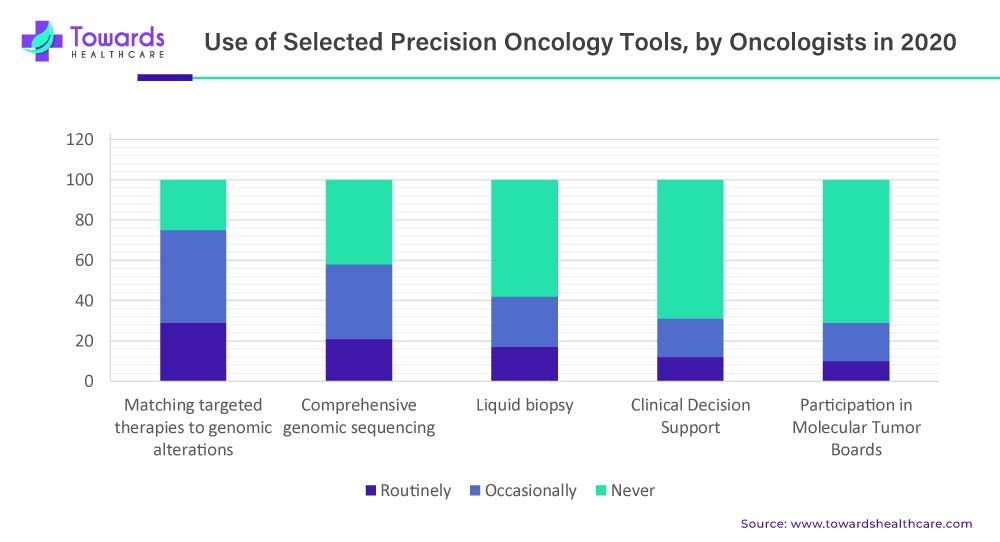
The growing availability of genomic sequencing technologies and the decreasing costs associated with genomic profiling has also contributed to the increasing demand for personalized medicine in oncology. Next-generation sequencing platforms and molecular diagnostics have become more accessible, enabling healthcare providers to profile tumors at a molecular level and identify actionable genetic alterations.
Additionally, patients are becoming more informed and engaged in their healthcare decisions. With the widespread availability of information through the internet and patient advocacy groups, patients are increasingly seeking personalized treatment options and exploring precision oncology approaches. They are willing to undergo genomic testing and collaborate with healthcare providers to develop personalized treatment plans. Furthermore, regulatory bodies and healthcare systems are recognizing the potential benefits of precision oncology and supporting its integration into clinical practice. Initiatives such as the inclusion of biomarker testing in treatment guidelines and the development of companion diagnostics for targeted therapies have paved the way for the adoption of precision oncology approaches.
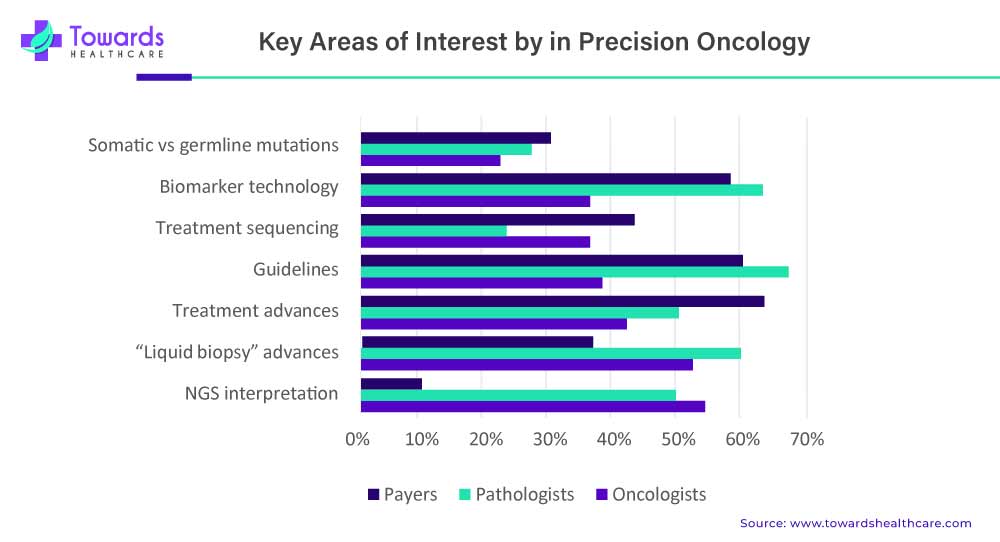
Thus, the increasing demand for personalized medicine has played a significant role in driving the growth of the precision oncology market. Patients and healthcare providers are seeking more precise and effective treatment options that consider the tumor's individual characteristics. The availability of advanced genomic profiling technologies, patient engagement, and support from regulatory bodies have further fueled the adoption of precision oncology in cancer care. As personalized medicine continues to gain traction, the precision oncology market is expected to expand to meet the growing demand for targeted and personalized cancer treatments.
Advancements in genomic research present significant opportunities in the field of precision oncology. Genomic research involves studying the genetic makeup of tumors and identifying specific genetic alterations or mutations that drive cancer growth. This knowledge enables the development of targeted therapies that specifically address the underlying genetic abnormalities in individual patients. Genomic research presents a significant opportunity for the identification of novel biomarkers and therapeutic targets in cancer. Advances in our understanding of the genetic underpinnings of the disease have led to the discovery of new biomarkers and genetic alterations linked to specific cancer types. These biomarkers have various applications, including early detection, prognosis, and predicting treatment response. Moreover, they pave the way for the development of targeted therapies that specifically address the abnormal genes or pathways responsible for cancer progression.
Another opportunity lies in the integration of genomic information into clinical practice. Genomic profiling of tumors allows oncologists to tailor treatment strategies based on the specific genetic alterations present in a patient's tumor. This personalized approach can lead to more effective and precise treatment decisions, improving patient outcomes and minimizing unnecessary treatments or adverse effects. With advancements in technology and decreasing costs of genomic sequencing, the integration of genomic information into routine clinical practice is becoming more feasible.
The use of genomic data in clinical trials is also an important opportunity in precision oncology. Genomic profiling can help identify patients who are more likely to respond to specific targeted therapies, enabling more efficient patient selection for clinical trials. This targeted approach increases the likelihood of successful clinical trial outcomes and expedites the development and approval of new precision oncology treatments.
Thus, advancements in genomic research offer substantial opportunities in precision oncology. The identification of novel biomarkers, integration of genomic information into clinical practice, utilization of genomic data in clinical trials, development of companion diagnostics, and the application of computational tools and artificial intelligence all contribute to the advancement of precision oncology. These opportunities have the potential to transform cancer care, improve patient outcomes, and drive further innovation in personalized cancer treatments.
The high cost of precision oncology treatments represents a significant restraint in the market. Precision oncology involves the use of advanced diagnostic tests, genomic sequencing, and targeted therapies, which can be expensive to develop, manufacture, and administer. The cost of genetic testing, molecular profiling, and targeted drugs can be prohibitive for some patients and healthcare systems. The intricate nature of precision oncology treatments is a significant factor contributing to their high costs. The development of targeted therapies necessitates extensive research, clinical trials, and regulatory approvals, which require substantial investments in time and resources. The expenses associated with developing and validating biomarkers, identifying actionable mutations, and designing personalized treatment regimens all contribute to the overall cost of precision oncology.
Another factor driving up the cost is the limited patient population for targeted therapies. Precision oncology treatments are designed to target specific genetic mutations or molecular alterations, which means they are only suitable for a subset of patients with those particular characteristics. This limited patient pool reduces economies of scale and makes it challenging to achieve cost efficiencies in the production and distribution of targeted drugs.
Efforts are underway to address the cost challenges in precision oncology. Research institutions, pharmaceutical companies, and policymakers are exploring strategies to reduce the cost of genetic testing, improve the efficiency of drug development processes, and negotiate pricing agreements to make precision oncology more affordable and accessible. Additionally, advancements in technology, such as the use of artificial intelligence and data analytics, may help streamline and optimize treatment decisions, potentially reducing costs associated with trial-and-error approaches.
While precision oncology holds immense promise in improving cancer treatment outcomes, the high cost of these therapies remains a significant restraint in the market. Continued efforts to drive cost efficiencies, expand insurance coverage, and promote value-based pricing models are essential to ensure broader access to precision oncology treatments and maximize their potential benefits for patients.
Which Product Segment Dominated the Precision Oncology Market?
By product, the therapeutics segment held a dominant presence in the market. Precision medicines are widely used for treating different types of cancers. As therapeutics, precision medicine provides targeted therapy without affecting the normal cells of humans, significantly reducing adverse effects and toxicity. The growing research and development activities and new product launches govern the segment’s growth. According to the American Association for Cancer Research, the U.S. FDA approved around 198 new oncology drugs from 1998 to 2023. Out of these, approximately 43% or 86 drugs were precision oncology drugs.
By product, the diagnostics segment is expected to grow at the fastest rate in the market during the forecast period. Precision oncology diagnostics are used to determine the root cause of the disease in individual patients and help researchers suggest personalized treatment. Advancements in molecular diagnostics and favorable government policies boost the segment’s growth. Several government organizations have launched initiatives for screening and early detection of cancer.
Why Did the Breast Cancer Segment Dominate the Precision Oncology Market?
By cancer type, the breast cancer segment held the largest share of the market. The rising incidences of breast cancer and the increasing recurrence rates augment the segment’s growth. The increasing public and private funding for breast cancer research also propels the segment’s growth.
By cancer type, the cervical cancer segment is anticipated to grow with the highest CAGR in the market during the studied years. The increasing awareness of cervical cancer screening and early identification necessitates the development of precision medicine for cervical cancer. Favorable government support and the rising incidences of cervical cancer cases fuel the segment’s growth. The World Health Organization launched the Cervical Cancer Elimination Initiative along with the United Nations and other agencies.
How the Hospitals & Diagnostic Laboratories Segment Dominated the Precision Oncology Market?
By end-use, the hospitals & diagnostic laboratories segment led the global market. The segmental growth is attributed to suitable capital investments, an increasing number of patients, and the rising adoption of advanced technologies. The growing number of hospitals and diagnostic laboratories for cancer diagnosis and treatment also boosts the market. There are around 72 NCI-directed cancer clinics in the U.S.
By end-use, the pharmaceutical & biotechnology companies segment is projected to expand rapidly in the market in the coming years. The state-of-the-art research and development facilities, new product launches, and the burgeoning pharmaceutical & biotechnology sector fuel the segment’s growth.
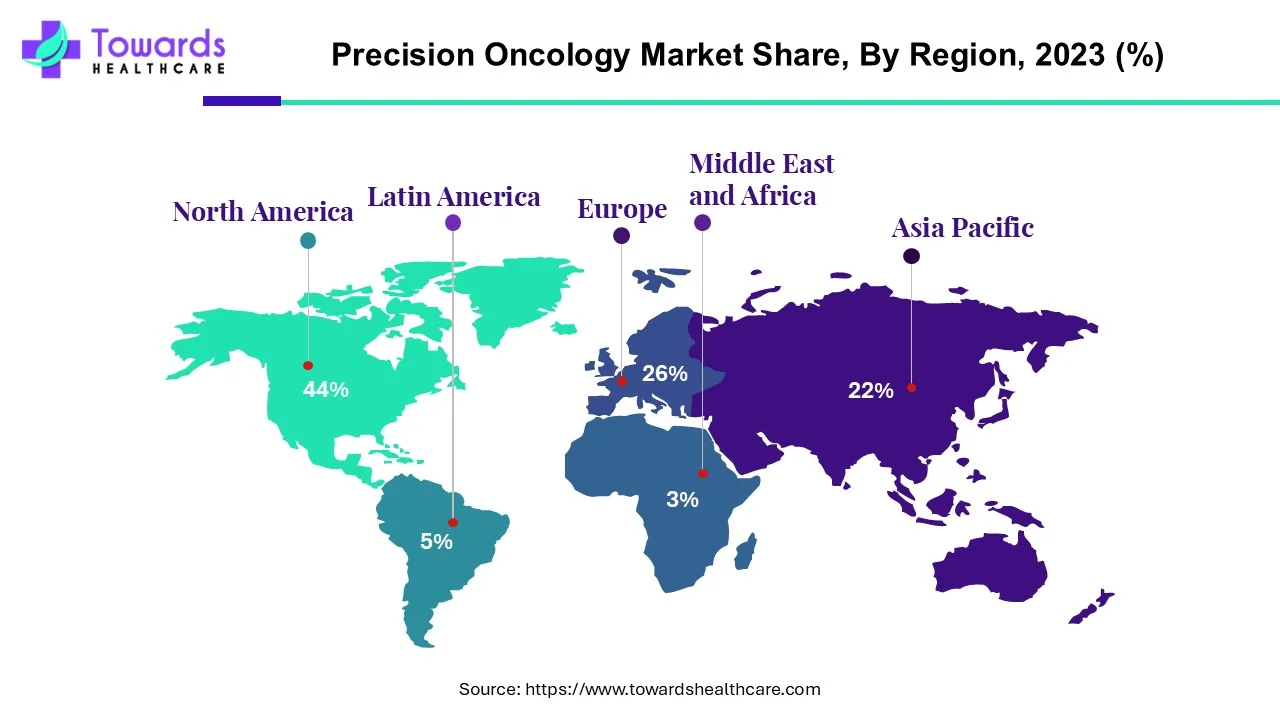
North America, particularly the United States, plays a pivotal role in the field of precision oncology. The United States has been at the forefront of cancer research, innovation, and the implementation of precision medicine approaches in clinical practice. The United States has a robust regulatory framework that supports the development and approval of precision oncology therapies and companion diagnostics. The FDA has established programs such as the Breakthrough Therapy Designation and the Accelerated Approval Program to expedite the review and approval of innovative precision medicine interventions.
Additionally, the U.S. has a large patient population and a high burden of cancer, driving the demand for effective and personalized cancer treatments. The high prevalence of breast cancer across the U.S. augments the demand for precision oncology therapies. Breast cancer represents approximately 30% of new cancer cases among women annually in the United States. Around 1 in 8 women in the U.S. are estimated to be diagnosed with breast cancer in their lifetime. Patients and their families are increasingly aware of the potential benefits of precision oncology and actively seek access to targeted therapies and genomic testing. The country's emphasis on patient-centered care and shared decision-making further supports the integration of precision oncology in clinical settings.
Furthermore, the market for precision oncology products and services in the United States is also significant. The country is home to major pharmaceutical companies, biotechnology firms, and diagnostic companies that invest heavily in research and development, clinical trials, and the commercialization of precision oncology technologies. These companies collaborate with academic institutions and healthcare providers to bring novel therapies, biomarkers, and genomic profiling tests to the market, providing clinicians with essential tools for precise cancer diagnosis and treatment.
The U.S. market is growing rapidly due to advancements in precision medicine, including targeted therapies and immunotherapies. The integration of artificial intelligence is improving early cancer detection and treatment planning. Increased investment in research and development by pharmaceutical companies and a rising cancer prevalence, driven by an aging population, are also fueling market expansion and innovation in cancer care.
Canada's market is expanding due to significant government investment in healthcare innovation and the presence of strong research institutions like the Ontario Institute for Cancer Research. Additionally, private sector investments, such as acquisitions by companies like AstraZeneca, are boosting advancements in cancer treatments. These factors are collectively driving the growth of precision oncology in Canada.
On the other hand, Asia Pacific is emerging as one of the fastest-growing regions in the field of precision oncology. The region encompasses countries such as China, Japan, South Korea, Australia, and India, among others, which are making significant strides in advancing precision medicine approaches for cancer care.
Asia Pacific is witnessing remarkable growth in precision oncology due to the increasing cancer burden, supportive government initiatives, advancements in genomic research and diagnostics, collaborative efforts, and the growing acceptance of personalized medicine among healthcare professionals and patients. As the region continues to invest in precision oncology infrastructure, research, and clinical implementation, it is poised to play a significant role in shaping the future of cancer care and improving patient outcomes.
China's market is growing due to high cancer incidence, with millions of new cases annually. Government support through initiatives like the Healthy China 2030 plan and regulatory reforms accelerates the development of oncology treatments. Technological advancements in sequencing and AI enhance personalized care, while increasing investment and partnerships, such as AstraZeneca's acquisition of Gracell Biotechnologies, further strengthen the market.
India's market is expanding due to rising cancer incidence, technological advancements like AI and big data, government initiatives promoting innovation, growth in R&D by companies like Bristol-Myers Squibb, and increasing academic-industry collaborations for clinical trials.
Europe's market is growing due to high cancer prevalence, robust healthcare infrastructure, and government initiatives like the EU Cancer Mission. Strong research institutions and biotech companies drive innovation, while supportive regulatory frameworks accelerate the approval of precision oncology treatments, positioning Europe as a leader in the field.
The UK market is growing due to government initiatives like the 100,000 Genomes Project, which enhances personalized cancer treatment. Additionally, the robust healthcare infrastructure provided by the NHS and active research collaborations between academic and biotech institutions are driving innovation in cancer therapies.
Germany's market is growing due to significant government investments in healthcare innovation, strong research infrastructure, and private sector involvement. Initiatives and collaborations enhance cancer treatment advancements, positioning Germany as a key player in precision oncology.
The Middle East & Africa are expected to grow at a notable CAGR in the foreseeable future. The rising prevalence of cancer, favorable government support, and evolving regulatory landscapes boost the market. Government bodies launch initiatives and provide funding to encourage the general public to screen for, diagnose, and treat cancer. They also make constant efforts to establish a suitable research and manufacturing infrastructure. People are becoming aware of personalized medicines and their benefits.
The availability of precision oncology medicines, such as immunotherapies, monoclonal antibodies, and antibody-drug conjugates, is anticipated to grow continuously in the region. This is actively supported by the Emirati Genome Program of the UAE government. The government also provides reimbursement for these therapies, and the median reimbursement time in the UAE is much faster at 6 months compared to other MEA countries.
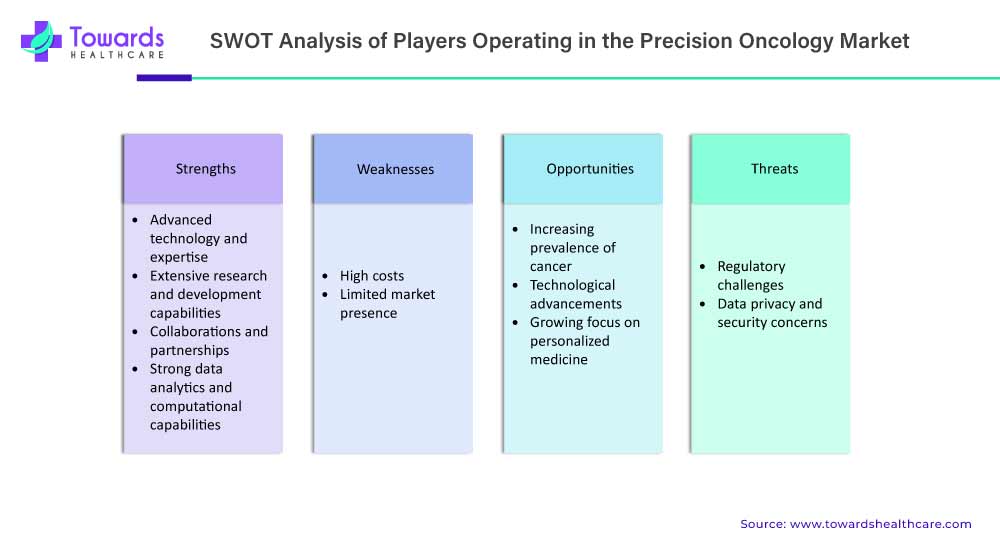
Strengths:
Weaknesses:
Opportunities:
Threats:
The competitive landscape in precision oncology is dynamic and evolving as more companies and research institutions are actively involved in this field. everal pharmaceutical companies are investing in precision oncology research and development, aiming to discover and develop targeted therapies that can effectively treat specific genetic alterations or biomarkers in cancer. Diagnostic companies play a crucial role in precision oncology by providing advanced genetic testing and molecular diagnostics services.
Mr. Mohan Uttarwar, CEO of OneCell Diagnostics, envisioned that AI could shape the future of precision oncology along with interdisciplinary collaborations and comprehensive data analytics. He also said that perceiving AI as augmented intelligence would complement and enhance the decision-making capabilities of oncologists.
By Product
By Cancer Type
By End-Use
By Region
February 2026
February 2026
February 2026
February 2026
